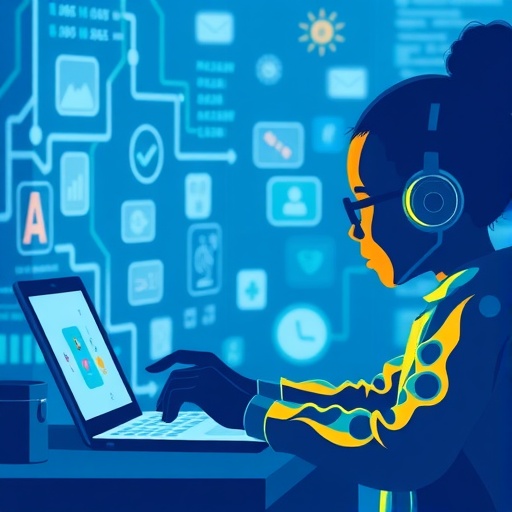In recent years, the intersection of technology and education has emerged as a pivotal area of research, particularly concerning its potential impact on social and mental health outcomes for students. A groundbreaking study by Robinson and Van Ryzin, set to be published in the journal School Mental Health, explores the comparative effectiveness of technology-supported cooperative learning versus traditional curriculum-based social and emotional learning (SEL) programs. This research is timely, considering that the educational landscape continues to evolve rapidly, especially in light of recent global disruptions.
The core idea driving the research is the need to foster positive social interactions and mental health among students. It is widely recognized that mental health issues among children and adolescents are on the rise, prompting educators and researchers alike to seek innovative solutions that can make a difference. One aspect of the solution may lie in the adoption of technology within educational frameworks, specifically through collaborative learning environments that are supported by digital tools and resources.
In their study, Robinson and Van Ryzin delve into the theory behind cooperative learning, which asserts that students learn more effectively when they work together in structured groups. This approach encourages interaction, communication, and collaboration, which are essential skills for developing emotional intelligence and social awareness. By blending traditional cooperative learning with technology, educators may enhance these interactions, making them more dynamic and engaging for students.
The research methodology adopted by the authors is rigorous and multifaceted. They employ both qualitative and quantitative research methods to capture the comprehensive impact of technology-supported learning. This dual approach allows for a nuanced understanding of how students experience and benefit from various educational interventions. Preliminary findings indicate that students who participated in technology-enhanced cooperative learning reported higher levels of engagement and enthusiasm for group activities compared to those involved in standard SEL curricula.
The significance of this study cannot be understated. In an era characterized by digital distractions and isolation, leveraging technology for cooperative learning could represent a vital shift in how we approach social and emotional development in schools. The pandemic has underscored the importance of social connections and mental health resources. With many students experiencing isolation due to remote learning, re-integrating them into collaborative environments—albeit through technology—could mitigate some of the negative impacts of their recent experiences.
Moreover, the study emphasizes the role of educators in implementing these strategies effectively. Training teachers to integrate technology into their teaching practice is crucial for maximizing the potential benefits of these programs. The authors highlight the need for professional development that prepares educators to not only use technology but to do so in a way that promotes meaningful learning experiences. This is equally important for ensuring that technology does not become a mere substitute for face-to-face interaction.
From a psychological perspective, the impact of technology-supported cooperative learning on students’ mental health and social skills is an area of significant concern. The research suggests that when students engage comprehensively with their peers using technology, it can bolster their self-esteem and sense of belonging. Positive outcomes such as increased empathy and improved conflict resolution skills were also reported. These findings could redefine how academic success is measured, placing equal weight on emotional and social development alongside traditional academics.
As educators and policy-makers consider the implications of this study, it raises pivotal questions about curriculum design in the future. Will traditional SEL programs adapt to include technology-enhanced methodologies, or will entirely new frameworks emerge? The willingness of educational institutions to innovate will play a crucial role in whether students reap the benefits of these advancements.
The way forward is not without challenges. Issues such as access to technology, equity in educational opportunities, and the need for balanced use of tech in learning environments need to be addressed. Addressing these challenges is vital, as disparities in access can exacerbate existing inequalities among students. Collaboration with stakeholders—including parents, educators, and community organizations—will be essential in developing inclusive solutions that prioritize student well-being.
As this research gains traction in academic circles and beyond, it is poised to spark further discussions about optimal teaching practices in a technologically driven world. Future studies will likely delve deeper into the dynamics of student interactions in digital environments and how these relate to broader educational outcomes. The potential for technology to transform cooperative learning environments into vibrant hubs of creativity and emotional growth presents an exciting frontier for educational researchers.
Ultimately, the work of Robinson and Van Ryzin serves as a clarion call for a rethink of how technology is utilized in educational settings. Their findings pave the way for more proactive approaches to enhancing student mental health and social skills, emphasizing the importance of cooperative learning as a fundamental aspect of the educational experience in the 21st century. As our understanding of these intersections deepens, the possibility of crafting educational landscapes that truly cater to the holistic development of students becomes increasingly achievable.
In conclusion, the investigation into technology-supported cooperative learning represents a crucial step in understanding how we can better support students’ social and emotional health. Policymakers, educators, and community members must remain vigilant and proactive as these developments unfold. With a commitment to innovation and inclusivity, the educational sector can harness the power of technology to create more positive, supportive, and engaging learning environments that will benefit future generations.
Subject of Research: Technology-Supported Cooperative Learning vs. Curriculum-Based SEL
Article Title: Promoting Positive Social and Mental Health Outcomes: Technology-Supported Cooperative Learning vs. Curriculum-Based SEL
Article References:
Robinson, L.E., Van Ryzin, M.J. Promoting Positive Social and Mental Health Outcomes: Technology-Supported Cooperative Learning vs. Curriculum-Based SEL. School Mental Health (2025). https://doi.org/10.1007/s12310-025-09832-4
Image Credits: AI Generated
DOI: https://doi.org/10.1007/s12310-025-09832-4
Keywords: technology, cooperative learning, social-emotional learning, mental health, education




